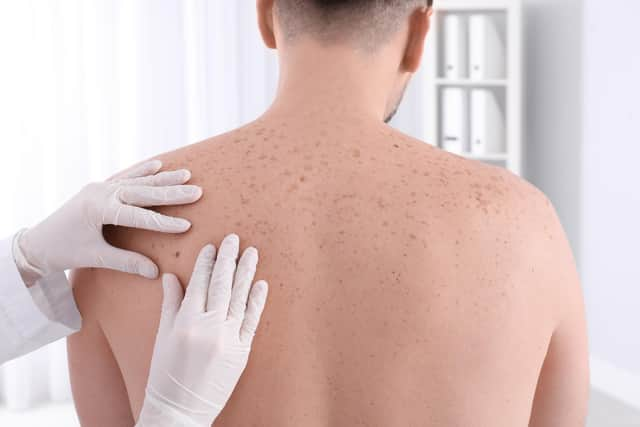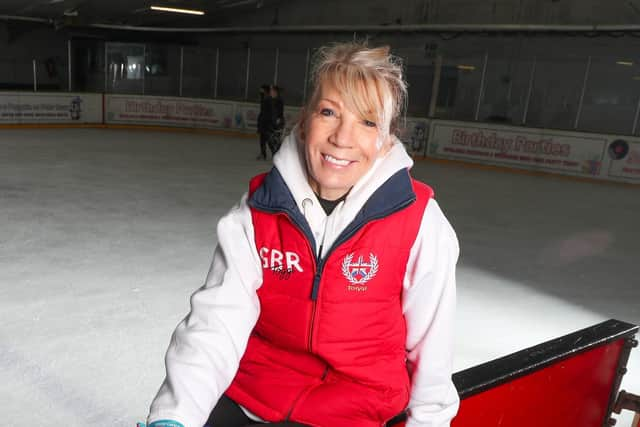Plea to seek medical help if you show any signs of skin cancer as Hampshire revealed as one of the worst spots in the country for malignant tumours
and live on Freeview channel 276
Figures compiled from NHS Digital and the government show that in 2019, 38.2 people out of every 100,000 within the Hampshire, Southampton and Isle of Wight CCG area were diagnosed with malignant melanoma tumours – placing it as the 18th highest rate out of 106 locations.
In the same area the number of tumours diagnosed increased between 2014 and 2019, from 593 to 614 (a 3.5 per cent rise).


Advertisement
Hide AdAdvertisement
Hide AdAnd across the whole of the south east there was a 15.3 per cent rise of malignant melanoma of skin and a 15.8 per cent rise in other malignant neoplasms of skin in the same time period.
This matches a national trend where overall there was a 12.7 per cent increase in skin cancer in that time.
Mum-of-two and champion ice skater Debbie Hood, was about 30 when she noticed a mole on her face started to turn from brown to red.
‘It looked really red and angry,’ she said.


She had already been through two cancer scares previously after finding lumps on her chest.
Advertisement
Hide AdAdvertisement
Hide AdThe 59-year-old said: ‘I was being really cautious and went to the doctor as soon as I could.
‘They said it was benign but they wanted to remove it because these things can change. I would tell people to be vigilant and be persistent in getting things checked.
‘It was the same with the lumps on my chest, it was lucky I got them removed.’
She added: ‘I’ve seen the effects of skin cancer on people I know. Everything you do to your body when you’re younger has a consequence.
Advertisement
Hide AdAdvertisement
Hide Ad‘So I don’t stay out in the sun anymore – the fake tan is just as good.’
Around one in 47 women will be diagnosed with melanoma skin cancer in their lifetime, with skin cancer the fifth most common skin cancer in the UK.
Over the last decade, the number of people diagnosed with melanoma in the UK has increased by almost half.
Karis Betts, senior health information manager at Cancer Research UK, agreed with Debbie’s message.
Advertisement
Hide AdAdvertisement
Hide Ad‘Be sure to tell your doctor about any new or unusual changes to your skin or nails,’ she said.’
‘It likely won’t be cancer, but when caught early cancer is easier to treat.
‘Up to nine out of 10 melanoma skin cancers in the UK could be prevented by staying safe in the sun and avoiding sunbeds.
‘When heading out this summer, think about spending time in the shade, covering up with a T-shirt, hat and sunglasses and regularly reapplying sunscreen to any bits that aren’t covered. Remember that even on cloudy days, you can get burnt, especially between 11am and 3pm when the sun is strongest.’
Advertisement
Hide AdAdvertisement
Hide AdMatthew Gass, from the British Association of Dermatologists, warned people not to reply on SPF moisturisers for protection.
He said while these are tested in the same way as sunscreens, in reality they “tend to be applied much more thinly, and as such they don’t offer the same level of protection as the equivalent sunscreen”.
‘You should only rely on these when you’re getting brief, incidental sun exposure, for example if you are popping out to the shops,’ he said’
‘Skin cancer cases have been on the rise since the 1970s and it is now the most common cancer in the UK. So it is not necessarily a surprise to see that the most recent skin cancer figures for England show that rates have risen again.’
Advertisement
Hide AdAdvertisement
Hide AdHe added: ‘It is also possible that changes to sun-seeking behaviour are a factor.’
Within Portsmouth there was actually a slight decrease in the number of malignant melanoma tumours diagnosed between 2014 to 2019, from 59 to 61.
But in 2019, 27.5 people out of every 100,000 of the population were diagnosed with the tumours.
Roger Batterbury, chairman of Healthwatch Portsmouth, said: ‘Healthwatch Portsmouth finds the upward trend of malignant skin cancer across the south east a concern, and in particular that the downward trend of diagnosis in Portsmouth perhaps highlights difficulties in the health system being faced which relate to the detection of skin cancer.
Advertisement
Hide AdAdvertisement
Hide Ad‘Healthwatch Portsmouth supports the British Association of Dermatologists’ advice to use appropriate protection levels of sunblock, keep safe in the sun, drinking water and covering up where necessary including wearing a hat.’
Dr Linda Collie, GP and clinical lead for NHS Portsmouth Clinical Commissioning Group, added: ‘To reduce the chances of developing skin cancers, people should apply sun cream of at least SPF factor 30 on a regular basis to avoid burning, stay out of the sun when it's at its strongest between 11am and 3pm, and avoid using sunbeds.
‘We know that 86 per cent of melanoma skin cancer cases could have been prevented, which is why it's so important to be safe in the sun.’
For melanomas, the most common sign is the appearance of a new mole or a change in an existing mole.
Advertisement
Hide AdAdvertisement
Hide AdThe first sign of non-melanoma skin cancer is usually the appearance of a lump or discoloured patch on the skin that persists after a few weeks. It slowly progresses over months or sometimes years.
In most cases, cancerous lumps are red and firm and sometimes turn into ulcers, while cancerous patches are usually flat and scaly.
In either case, report any concerning symptoms to your GP.
Comment Guidelines
National World encourages reader discussion on our stories. User feedback, insights and back-and-forth exchanges add a rich layer of context to reporting. Please review our Community Guidelines before commenting.
